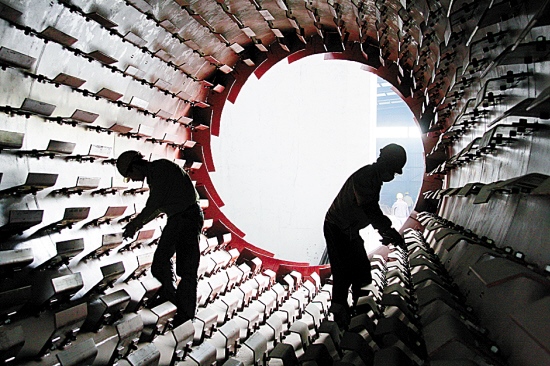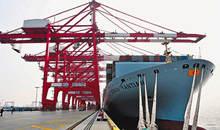
China’s manufacturing activity continued to expand in large companies but dipped in the private sector in May, evidence that there is not yet a firm recovery in the economy.
The official purchasing managers’ index, which reflects operational conditions in largely state-owned manufacturers, ended at 50.1 in May, flat from April, according to the National Bureau of Statistics and the China Federation of Logistics and Purchasing.
The reading, however, has remained in the above 50 expansionary zone for three consecutive months.
The Caixin China PMI, an indicator slanted toward private and export-oriented manufacturing companies, however dipped to 49.2 in May from 49.4 in April, and below the neutral 50 mark for the 15th successive month.
Zhao Qinghe, an analyst at the National Bureau of Statistics, said production at manufacturers increased and purchasing activities accelerated, but weak domestic and overseas demand weighed on new orders and new export-oriented orders, adding pressure on future business operations.
The production component index in the official PMI rose 0.1 point month on month in May to 52.3, while new orders fell for the second straight month to 50.7 points.
Responding to the Caixin China PMI data, Zhong Zhengsheng, director of macroeconomic analysis at CEBM Group said: “Readings for the output and new order categories fell again, but employment improved slightly. Overall, China’s economy has not been able to sustain the recovery it had in the first quarter and is in the process of bottoming out.”
The headline index was hurt by a renewed fall in total new business placed at Chinese manufacturers in May while employment at the manufacturers continued falling, components of the Caixin China PMI showed.
Meanwhile, the official non-manufacturing PMI for May — a corresponding gauge for service activity — fell by 0.4 point month on month to 53.1.
Zhao at the statistics bureau attributed the decline to cooler financial business activities hurt by stock market volatility, offsetting warmer activities in retailing, catering, tourism, and construction sectors.
Julian Wang, China economist at HSBC, said the PMIs in May showed persistent risks from weak external demand and potentially slower sales.
“The official manufacturing PMI held up at 50.1, helped by re-stocking. The Caixin PMI showed a similar picture, although it registered a larger fall in export orders, which weighed on the headline index,” Wang said.
(Source: ShanghaiDaily Author: Feng Jianmin)



























 沪公网安备31010402003309号
沪公网安备31010402003309号